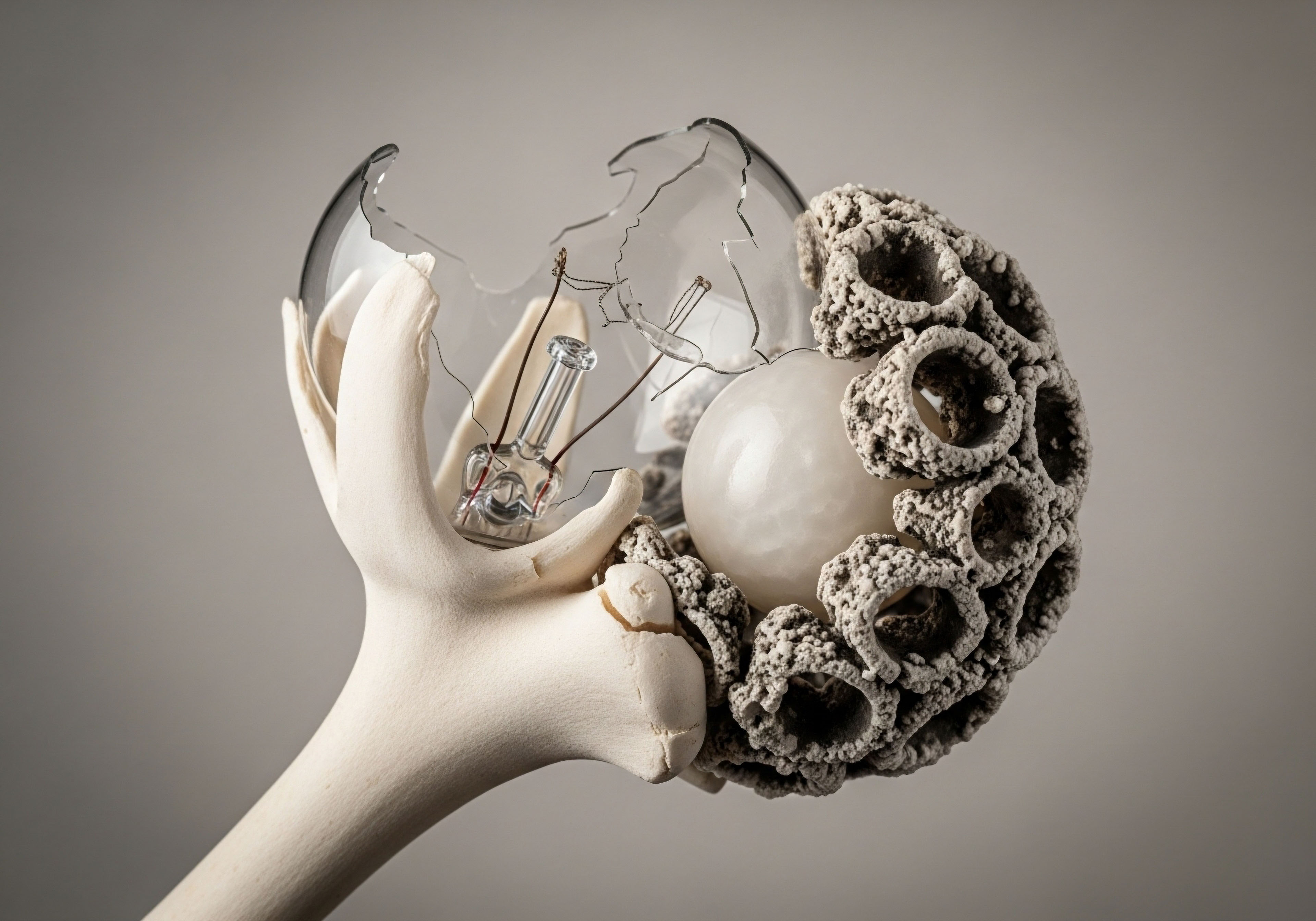

Fundamentals
The subtle shifts in how your mind functions, the moments of forgetfulness, or the unexpected changes in mental clarity can feel deeply unsettling. Many individuals experience these cognitive alterations, often attributing them to the natural progression of time or daily stressors. Yet, beneath these lived experiences lies a complex interplay of biological systems, with hormonal balance standing as a significant conductor of cognitive vitality. Understanding these underlying mechanisms is the first step toward reclaiming mental sharpness and overall well-being.
Our biological systems are not static; they are dynamic, constantly adapting to internal and external signals. Hormones, often described as the body’s internal messaging service, orchestrate a vast array of physiological processes, including those within the brain. These chemical messengers travel through the bloodstream, influencing cellular activity across various neural regions. When these hormonal signals become imbalanced, their impact can extend beyond reproductive health, directly affecting mood, energy levels, and, critically, cognitive function.
Hormonal balance acts as a vital conductor for cognitive vitality, influencing mental clarity and overall well-being.
The brain, a highly metabolically active organ, relies on a steady and appropriate supply of these hormonal signals for optimal performance. Sex hormones, such as testosterone and estrogen, are particularly influential in shaping cognitive landscapes throughout life. Their presence, or absence, can affect neuronal health, synaptic plasticity, and neurotransmitter systems, all of which are foundational to processes like memory, attention, and executive function.

The Endocrine System and Brain Health
The endocrine system, a network of glands that produce and secrete hormones, communicates with the nervous system to regulate bodily functions. This intricate communication system ensures that various physiological processes are synchronized. When considering cognitive support, the focus often turns to the hypothalamic-pituitary-gonadal (HPG) axis, a central regulatory pathway for sex hormone production. Disruptions along this axis, whether due to aging, stress, or other factors, can lead to hormonal deficiencies that manifest as cognitive symptoms.
For both men and women, maintaining a balanced hormonal environment is paramount for brain health. The brain contains receptors for various hormones, indicating their direct influence on neural cells. These interactions can modulate brain structure and function, affecting everything from mood regulation to complex problem-solving abilities. A decline in specific hormone levels can correlate with a subjective experience of mental fog or reduced cognitive endurance.

Sex Differences in Cognitive Profiles
It is well-documented that men and women often exhibit distinct cognitive profiles, with certain abilities showing average differences. These variations are not absolute for every individual but represent general patterns observed across populations. Scientific evidence suggests that sex hormones contribute to these differences.
- Verbal Abilities ∞ Women frequently demonstrate superior performance in verbal tasks, including verbal memory, verbal fluency, and perceptual speed. This advantage may be partly linked to the influence of estrogen on speech production and phonological processing.
- Visuospatial Abilities ∞ Men typically excel in visuospatial tasks, mathematical problem-solving, and visual memory. Testosterone and other androgens are thought to play a role in these spatial abilities.
These inherent differences underscore why hormonal protocols for cognitive support must be tailored to the unique biological architecture of each sex. A blanket approach risks overlooking the specific hormonal influences that shape individual cognitive strengths and vulnerabilities. Recognizing these distinctions allows for a more precise and effective strategy in optimizing brain function.


Intermediate
Once a foundational understanding of hormonal influence on cognition is established, the conversation naturally progresses to specific clinical protocols designed to restore balance and support mental acuity. These interventions are not merely about addressing symptoms; they aim to recalibrate the body’s internal systems, allowing for a return to optimal function. The precise application of these protocols varies significantly between men and women, reflecting their distinct endocrine landscapes and cognitive needs.
Hormonal optimization protocols are designed with careful consideration of individual biochemistry. The goal is to provide the body with the appropriate hormonal signals it requires, in the right concentrations, to support overall well-being, including brain health. This often involves the use of specific therapeutic agents, each with a unique mechanism of action within the endocrine system.
Hormonal optimization protocols recalibrate internal systems, supporting mental acuity through precise, individualized interventions.

Testosterone Replacement Therapy for Men
For men experiencing symptoms associated with declining testosterone levels, often referred to as low testosterone or andropause, Testosterone Replacement Therapy (TRT) can be a transformative intervention. Symptoms such as reduced mental clarity, diminished memory, and a general lack of cognitive drive are frequently reported by men with suboptimal testosterone.
TRT aims to restore physiological testosterone levels, which can positively influence various cognitive domains. Studies indicate that TRT may improve spatial memory, constructional abilities, and verbal memory in men with testosterone deficiency or mild cognitive impairment.
A standard protocol for male hormone optimization often involves weekly intramuscular injections of Testosterone Cypionate (200mg/ml). This method ensures a consistent supply of the hormone, mimicking the body’s natural pulsatile release to some extent. To maintain the body’s intrinsic testosterone production and preserve fertility, Gonadorelin is frequently included, administered via subcutaneous injections twice weekly.
Gonadorelin acts on the pituitary gland, stimulating the release of luteinizing hormone (LH) and follicle-stimulating hormone (FSH), which in turn signal the testes to produce testosterone.
Another critical component in male TRT protocols is Anastrozole, an oral tablet typically taken twice weekly. Testosterone can convert into estrogen through a process called aromatization. While some estrogen is beneficial for men, excessive levels can lead to undesirable side effects, including potential cognitive issues.
Anastrozole acts as an aromatase inhibitor, helping to manage estrogen conversion and maintain a healthy testosterone-to-estrogen balance. In some cases, Enclomiphene may be incorporated to further support LH and FSH levels, particularly when fertility preservation is a primary concern.

Testosterone Replacement Therapy for Women
Women also experience the effects of declining hormone levels, which can significantly impact cognitive function. While often associated with menopause, hormonal shifts can occur in pre-menopausal and peri-menopausal stages, leading to symptoms such as irregular cycles, mood changes, hot flashes, and reduced libido, alongside cognitive complaints. Testosterone, though present in much lower concentrations in women than in men, plays a vital role in female physiology, including brain health.
Female testosterone protocols are carefully calibrated to reflect these lower physiological requirements. Typically, Testosterone Cypionate is administered weekly via subcutaneous injection, with dosages ranging from 10 ∞ 20 units (0.1 ∞ 0.2ml). This precise dosing helps to avoid supraphysiological levels, which could lead to unwanted side effects. Research suggests that both estrogen and progesterone can influence cognitive outcomes in women, with some evidence pointing to progesterone’s positive impact on verbal working memory.
Progesterone is a key component of female hormone balance protocols, prescribed based on menopausal status. For women with an intact uterus, progesterone is essential to protect the uterine lining when estrogen is also administered. Beyond its role in reproductive health, progesterone has neuroprotective properties and can influence brain activation patterns related to memory.
Another option for long-acting testosterone delivery in women is Pellet Therapy, where small pellets are inserted subcutaneously, providing a steady release of hormones over several months. Anastrozole may be used in conjunction with pellet therapy when appropriate, particularly if estrogen conversion becomes a concern.

Post-TRT or Fertility-Stimulating Protocols for Men
For men who have discontinued TRT or are actively trying to conceive, a specific protocol is implemented to restore natural hormonal production and support fertility. This protocol focuses on stimulating the body’s intrinsic endocrine pathways.
- Gonadorelin ∞ Administered to stimulate the pituitary gland, promoting the release of LH and FSH, thereby encouraging testicular testosterone production and spermatogenesis.
- Tamoxifen ∞ A selective estrogen receptor modulator (SERM) that can block estrogen’s negative feedback on the hypothalamus and pituitary, leading to increased LH and FSH secretion.
- Clomid (Clomiphene Citrate) ∞ Another SERM that works similarly to Tamoxifen, stimulating endogenous testosterone production and improving sperm parameters.
- Anastrozole (Optional) ∞ May be included if estrogen levels remain elevated, to prevent excessive estrogen conversion during the recovery phase.

Growth Hormone Peptide Therapy
Beyond sex hormones, other biochemical recalibrations can significantly influence cognitive function. Growth hormone (GH) and its associated peptides play a vital role in cellular repair, metabolic regulation, and neuroplasticity. These therapies are often sought by active adults and athletes aiming for anti-aging benefits, muscle gain, fat loss, and improved sleep quality, all of which indirectly support cognitive health. Research indicates that GH can improve cognitive function, enhance neurogenesis, and support vasculogenesis within the brain.
Key peptides utilized in this area include:
- Sermorelin ∞ A growth hormone-releasing hormone (GHRH) analog that stimulates the pituitary gland to produce and secrete its own natural growth hormone.
- Ipamorelin / CJC-1295 ∞ These are GH secretagogues that promote a more sustained and physiological release of growth hormone. Ipamorelin is known for its selective GH release with minimal impact on other hormones like cortisol.
- Tesamorelin ∞ A GHRH analog specifically approved for reducing visceral fat, which can have metabolic benefits that indirectly support brain health.
- Hexarelin ∞ Another GH secretagogue, often noted for its potent GH-releasing effects.
- MK-677 (Ibutamoren) ∞ An oral GH secretagogue that increases GH and IGF-1 levels by mimicking the action of ghrelin.
These peptides work by signaling the body to produce more of its own growth hormone, which in turn influences insulin-like growth factor-1 (IGF-1). Both GH and IGF-1 have direct effects on brain function, supporting neuronal survival, synaptic plasticity, and overall cognitive performance.

Other Targeted Peptides
The landscape of personalized wellness protocols extends to other targeted peptides that address specific physiological needs, which can indirectly contribute to cognitive well-being by improving overall systemic health.
- PT-141 (Bremelanotide) ∞ Primarily used for sexual health, addressing issues like low libido in both men and women. Improved sexual function can positively impact mood and overall quality of life, which are linked to cognitive vitality.
- Pentadeca Arginate (PDA) ∞ This peptide is utilized for tissue repair, healing processes, and inflammation modulation. Chronic inflammation can negatively affect brain health and cognitive function, so reducing systemic inflammation can offer indirect cognitive benefits.
Each of these protocols represents a precise intervention, designed to restore biochemical harmony and support the intricate systems that underpin cognitive function. The choice of protocol is always individualized, based on comprehensive lab assessments and a thorough understanding of the patient’s unique physiological needs and goals.


Academic
The distinctions in hormonal protocols for cognitive support between men and women are rooted in the fundamental differences in their endocrine physiology and the specific ways sex steroids interact with neural circuitry. Moving beyond general observations, a deeper exploration reveals the intricate molecular and cellular mechanisms by which these hormones exert their influence on brain function, necessitating tailored therapeutic strategies. The brain is not merely a passive recipient of hormonal signals; it actively responds and adapts, shaping cognitive outcomes.
Understanding the precise mechanisms of action requires a systems-biology perspective, acknowledging that hormones do not operate in isolation. They are part of complex feedback loops, influencing and being influenced by metabolic pathways, neurotransmitter systems, and even genetic predispositions. This interconnectedness means that optimizing one hormonal pathway can have cascading effects across multiple physiological domains, including those critical for sustained cognitive performance.
Hormonal protocols for cognitive support are precisely tailored, reflecting distinct endocrine physiologies and intricate sex steroid interactions with neural circuitry.

Neurosteroidogenesis and Brain Plasticity
Both testosterone and estrogen are synthesized not only in peripheral glands but also within the brain itself, a process known as neurosteroidogenesis. This local production allows for rapid, localized modulation of neuronal activity, independent of circulating hormone levels. For instance, estradiol, a potent estrogen, is synthesized from testosterone via the enzyme aromatase within specific brain regions, including the hippocampus and cortex.
These areas are vital for learning and memory. The presence of aromatase in male brains means that testosterone’s cognitive effects can be mediated directly by testosterone or indirectly through its conversion to estradiol.
In women, estradiol directly influences synaptic plasticity, particularly in the hippocampus, enhancing long-term potentiation (LTP), a cellular mechanism underlying learning and memory formation. Estrogen receptors (ERα and ERβ) are widely distributed throughout the brain, mediating estrogen’s effects on neuronal excitability, dendritic spine density, and neurogenesis.
The timing of estrogen exposure is critical; initiating estrogen therapy closer to the onset of menopause may offer neuroprotective benefits, while delayed initiation might not yield the same cognitive advantages. This concept, often termed the “critical window hypothesis,” suggests that neuronal systems are more responsive to hormonal interventions during specific periods of vulnerability or plasticity.

Androgenic Influence on Male Cognition
Testosterone in men influences cognitive function through multiple pathways. It can act directly on androgen receptors (AR) expressed in neurons and glial cells, or indirectly through its conversion to dihydrotestosterone (DHT) or estradiol. DHT, a more potent androgen, primarily binds to AR, affecting neuronal survival and dendritic morphology. Testosterone’s impact on visuospatial abilities and executive functions in men is well-documented. For example, studies have shown that testosterone supplementation can improve spatial memory and cognitive flexibility in hypogonadal men.
The relationship between testosterone and cognitive function is not linear; both very low and very high levels can be detrimental. Maintaining physiological ranges is key. Testosterone also influences neurotransmitter systems, including dopamine and serotonin pathways, which are critical for mood, motivation, and attention. A decline in testosterone can lead to alterations in these systems, contributing to symptoms like apathy and reduced mental drive.

Estrogen and Progesterone in Female Brain Function
The female brain is uniquely responsive to the cyclical and age-related changes in estrogen and progesterone. Estradiol is particularly important for verbal memory and executive functions. It modulates cholinergic systems, which are vital for attention and memory encoding. The loss of estradiol during menopause can lead to a decline in cholinergic tone, contributing to cognitive complaints.
Progesterone, often co-administered with estrogen in hormone therapy for women with an intact uterus, also exerts significant neuroactive effects. It is a precursor to neurosteroids like allopregnanolone, which acts as a positive allosteric modulator of GABA-A receptors, promoting calming and anxiolytic effects.
Progesterone has been shown to influence brain activation patterns during visual memory tasks and may improve verbal working memory. The type of progestin used in hormone therapy is a significant consideration, as synthetic progestins may have different cognitive effects compared to bioidentical micronized progesterone.
| Hormone | Primary Cognitive Impact (Men) | Primary Cognitive Impact (Women) |
|---|---|---|
| Testosterone | Visuospatial abilities, executive function, spatial memory, mood, motivation | Verbal memory, mood, libido, overall cognitive energy |
| Estrogen (Estradiol) | Verbal memory (via aromatization), neuroprotection | Verbal memory, executive function, cholinergic system modulation, neuroprotection |
| Progesterone | Indirect (via neurosteroids), calming effects | Verbal working memory, visual memory, neuroprotection, mood regulation |

Growth Hormone and Neuroplasticity
Growth hormone (GH) and its downstream mediator, Insulin-like Growth Factor-1 (IGF-1), are critical for brain health across the lifespan. Both GH and IGF-1 receptors are found throughout the central nervous system, particularly in regions associated with learning and memory, such as the hippocampus and cortex. GH deficiency, whether in childhood or adulthood, is linked to cognitive impairment, which can be ameliorated with GH replacement therapy.
The mechanisms by which GH and IGF-1 support cognition are multifaceted:
- Neurogenesis ∞ GH and IGF-1 promote the creation of new neurons, particularly in the hippocampus, a process vital for memory consolidation.
- Synaptic Plasticity ∞ They enhance the strength and efficiency of neuronal connections, which is fundamental for learning.
- Neuroprotection ∞ GH and IGF-1 exhibit protective effects against neuronal damage and oxidative stress, supporting neuronal survival.
- Cerebrovascular Health ∞ GH can improve cerebral blood flow and vasculogenesis, ensuring adequate nutrient and oxygen supply to brain tissue.
Peptides like Sermorelin and Ipamorelin, by stimulating endogenous GH release, indirectly support these neuroplastic processes. The benefits extend beyond direct cognitive enhancement, contributing to improved sleep architecture and metabolic health, both of which are foundational for optimal brain function.

Interplay with Metabolic Health and Neurotransmitters
Hormonal balance is inextricably linked to metabolic health, which profoundly impacts cognitive function. Conditions like insulin resistance, often associated with metabolic dysregulation, can impair brain glucose utilization and increase neuroinflammation, contributing to cognitive decline. Sex hormones influence insulin sensitivity and glucose metabolism, creating a bidirectional relationship where hormonal imbalances can worsen metabolic health, and vice versa.
Furthermore, hormones directly modulate neurotransmitter systems. Testosterone can influence dopamine pathways, affecting reward, motivation, and executive control. Estrogen interacts with serotonin and norepinephrine systems, impacting mood, anxiety, and attention. Progesterone’s influence on GABAergic signaling provides a calming effect, which can reduce stress-induced cognitive impairment. A comprehensive approach to cognitive support therefore considers not only hormone levels but also their broader impact on metabolic markers and neurotransmitter balance.
| Protocol | Primary Mechanism | Key Cognitive Benefits | Sex-Specific Considerations |
|---|---|---|---|
| Male TRT | Restores testosterone levels, modulates estrogen conversion | Improved spatial memory, verbal memory, executive function, mood, mental drive | Higher dosages, aromatase inhibition (Anastrozole) to manage estrogen, Gonadorelin for fertility |
| Female TRT | Restores physiological testosterone, balances with progesterone | Enhanced verbal memory, mood, libido, overall cognitive energy | Lower dosages, co-administration with Progesterone for uterine health, pellet therapy option |
| GH Peptide Therapy | Stimulates endogenous GH/IGF-1 production | Neurogenesis, synaptic plasticity, neuroprotection, improved sleep, metabolic support | Benefits generally apply to both sexes, supporting fundamental brain health mechanisms. |
The nuanced application of these protocols, informed by a deep understanding of endocrinology and neurobiology, allows for a truly personalized approach to cognitive well-being. It moves beyond simplistic solutions, recognizing the complex interplay of biological factors that contribute to mental vitality.

References
- Torres, J. M. et al. “Gender differences in cognitive functions and influence of sex hormones.” Transexualia, vol. 1, no. 1, 2016, pp. 1-10.
- Cherrier, M. M. et al. “Testosterone supplementation improves spatial and verbal memory in healthy older men.” Journal of Clinical Endocrinology & Metabolism, vol. 90, no. 5, 2005, pp. 2598-2604.
- Mosconi, L. et al. “Hormones are key in brain health differences between men and women.” American Heart Association News, 1 Feb. 2021.
- Maki, P. M. et al. “Distinct cognitive effects of estrogen and progesterone in menopausal women.” Neuropsychopharmacology, vol. 41, no. 5, 2016, pp. 1326-1335.
- Ong, L. K. et al. “Growth Hormone Improves Cognitive Function After Experimental Stroke.” Stroke, vol. 49, no. 5, 2018, pp. 1257-1266.
- Leal-Cerro, A. et al. “Treatment with Growth Hormone (GH) Increased the Metabolic Activity of the Brain in an Elder Patient, Not GH-Deficient, Who Suffered Mild Cognitive Alterations and Had an ApoE 4/3 Genotype.” Journal of Clinical Medicine, vol. 12, no. 1, 2023, p. 308.
- Webb, E. A. et al. “The Effects of Testosterone Supplementation on Cognitive Functioning in Older Men.” Frontiers in Endocrinology, vol. 11, 2020, p. 586348.
- Resnick, S. M. et al. “Long-term cognitive effects of menopausal hormone therapy ∞ Findings from the KEEPS Continuation Study.” PLoS Medicine, vol. 18, no. 3, 2021, e1003523.
- Torres, J. M. et al. “Gender differences in cognitive functions and influence of sex hormones.” ResearchGate, 23 Feb. 2025.
- Snyder, P. J. et al. “Effect of Testosterone Replacement Therapy on Cognitive Performance and Depression in Men with Testosterone Deficiency Syndrome.” Journal of Clinical Endocrinology & Metabolism, vol. 90, no. 5, 2005, pp. 2605-2613.

Reflection
Considering the intricate dance of hormones within your biological systems offers a profound opportunity for self-discovery. The knowledge presented here, detailing the distinct ways hormonal protocols can support cognitive function in men and women, is not merely information; it is a lens through which to view your own potential for vitality.
Your personal journey toward optimal health is unique, shaped by your individual biochemistry and lived experiences. This exploration of clinical science serves as a starting point, a foundation upon which to build a deeper understanding of your body’s needs.
Reclaiming mental sharpness and overall well-being is a collaborative process, one that benefits immensely from personalized guidance. This deep dive into hormonal influences on cognition underscores the importance of a tailored approach, moving beyond generic solutions to address the specific nuances of your endocrine system. The path to sustained cognitive health involves a continuous dialogue between your subjective experiences and objective clinical data, guiding you toward protocols that truly resonate with your physiological requirements.



